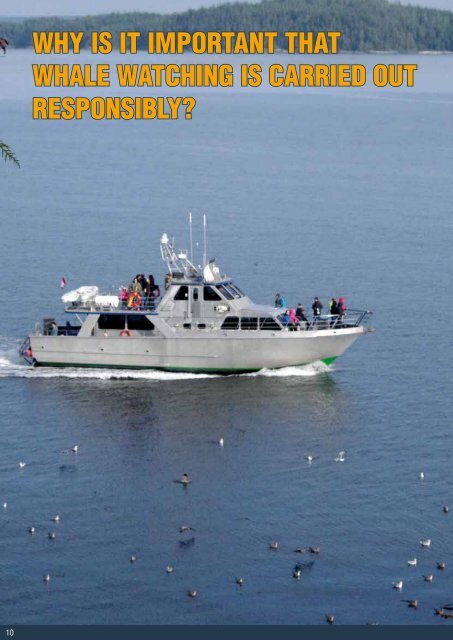Responsible Whale Watching
1gkqDcLwd
1gkqDcLwd
Create successful ePaper yourself
Turn your PDF publications into a flip-book with our unique Google optimized e-Paper software.
WHY IS IT IMPORTANT THAT<br />
WHALE WATCHING IS CARRIED OUT<br />
RESPONSIBLY?<br />
WHY IS IT IMPORTANT THAT WHALE WATCHING IS CARRIED<br />
OUT RESPONSIBLY?<br />
The phenomenal global success of this industry has not come without a price.<br />
In recent years, concerns have been raised about the industry’s possible impact<br />
upon individual or groups of whales and dolphins, and also at a population level.<br />
In many instances, whale watching involves targeting specific whale and dolphin<br />
communities for prolonged, often close-up, encounters. As the demand for more<br />
frequent encounters increases, it can be argued that it is the responsibility of all<br />
stakeholders (conservation authorities, the scientific community and the industry<br />
itself) to assess the effects of these activities upon these populations 5 . Short-term<br />
behavioural responses by whales and/or dolphins to vessels in close proximity<br />
have been well-documented. These include:<br />
■■<br />
Active avoidance or response to vessels: for example, rapidly changing speed<br />
or direction, or diving more frequently 6<br />
■■<br />
Changes in surface activity in the presence of boats 7<br />
■■<br />
Reduction in foraging behaviour of orcas 8<br />
■■<br />
Reduction in resting and socialising behaviour of dolphins 9<br />
■■<br />
Noise from vessels affecting dolphin vocalisation patterns 10<br />
Until recently, our understanding of whether these short-term behavioural<br />
responses might translate into longer-term negative impacts upon at least some<br />
individuals, populations or species has been poor; however, recent research has<br />
provided evidence that, for some study populations at least, vessel disturbance<br />
over time may indeed lead to long-term or permanent impacts, including:<br />
■■<br />
■■<br />
Long-term effects upon the health and reproductive success of targeted<br />
dolphins 11<br />
The apparent habitat shift of dolphins from areas heavily targeted by whale<br />
watching tourism 12<br />
■■<br />
Reduced female reproductive success of dolphins 13<br />
■■<br />
Serious, and often fatal, injury 14<br />
Long-term behavioural studies can provide regulatory bodies and wildlife<br />
managers with the scientific data to effectively manage whale watching activities.<br />
© Ulla Christina Ludewig<br />
10 11


